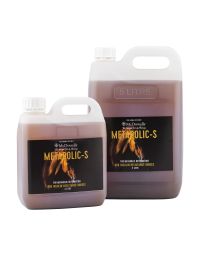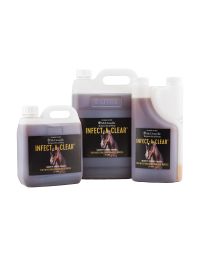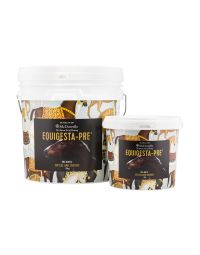Inflammation and oedema (fluid retention) in horses are more than surface-level symptoms - they are signs of deeper imbalance. These conditions often stem from complex internal factors, such as toxin overload, poor elimination, or immune dysregulation. By taking a natural and holistic approach - incorporating herbs, nutritional support, and environmental awareness - we can help the equine body restore balance and vitality.
Whether your horse is experiencing swollen legs, puffy joints, or recurring skin issues, it's essential to look beyond symptom management. With the right guidance, the natural healing process can be supported gently and effectively.
Supporting detoxification and reducing oedema in horses
Inflammation and oedema (fluid retention) in horses are more than symptoms—they are signals of imbalance within the body. At McDowells Herbal, we aim to look beyond the obvious, addressing the deeper causes and helping to restore natural health through herbal support, nutrition, and proper management.
Understanding oedema in horses
Oedema often stems from increased cellular permeability and poor lymphatic drainage. Known causes include toxin exposure, immune reactions, bacterial infections, trauma, vitamin C deficiency, or liver and kidney stress (Biognosis, Baroque Horse, Vol. 27).
When these causes are ruled out, we look deeper—toward sluggish elimination through the skin, lungs, bowel, liver, and kidneys. A slow detox system can result in a build-up of parasitic organisms, mycotoxins, and microbial waste in the gastrointestinal tract. This overload contributes to:
- Itchy or lumpy skin conditions
- Allergies
- Laminitis
- Reduced immunity
- Inflammation in the gut
- Ulceration and discomfort
- Behavioural issues or tension
Supporting elimination pathways is often the first and most important step in restoring balance and resilience.
Detoxification in Horses: A Step-by-Step Approach
Unlike humans or dogs, horses cannot fast. They require continual access to forage to avoid gut disturbances and blood sugar imbalances. Instead, we focus on gentle, daily practices that reduce toxic load and support internal balance.
1. Clean Feeding
For horses, achieving a clean diet can be challenging. Many modern feeds are high in grain, synthetic additives, or residues from herbicides and fertilisers. Whenever possible, offer:
- High-fibre, low-glycaemic roughage
- Pasture free of chemical sprays
- Minimal processed feed
- A diet free of excess sugars and starches
Adding appropriate herbs to a horse’s diet honours their natural grazing instincts. Horses evolved to thrive on diverse pasture and medicinal plants, many of which are no longer readily available in managed paddocks.
2. Gut Health and Microbiome Balance
The equine gastrointestinal tract mirrors the skin—it can suffer irritation, parasitic damage, and inflammation. Up to 80% of domestic horses may experience gastric ulcers at some point in their lives. Supporting the gut lining and microbial ecosystem is critical.
- Slippery elm provides mucosal protection, acts as a prebiotic, and helps repair the gut lining.
- Chamomile calms the nervous system and supports healthy digestion by shifting the horse from a ‘fight or flight’ state into a ‘rest and digest’ mode.
- Wormwood and garlic discourage parasitic overgrowth.
- Raw apple cider vinegar, used as a base in many McDowells tonics, helps balance pH and encourages microbial diversity.
These herbs not only reduce irritation but support the immune system and aid the processing of metabolic waste.
3. Organ Support: Liver, Kidneys, and Lungs
The liver and kidneys play a central role in eliminating toxins. When supported, they work efficiently to filter waste and prevent accumulation. Useful herbs include:
St Mary’s thistle – protects and regenerates liver tissue
Dandelion leaf and root – diuretic and liver tonic
Rosehips – antioxidant-rich, supporting immune and kidney health
Respiration is another often-overlooked elimination pathway. Ensuring the lungs and heart are functioning well improves circulation, oxygen delivery, and waste exhalation. Herbs like elecampane, nettle, rue, and hawthorn can be used to strengthen these systems.
4. Blood and Lymphatic Cleansing
“Blood cleansing” is a traditional term referring to the support of the body’s natural immune and elimination systems. Certain herbs, known as alteratives, are thought to assist in filtering waste and clearing metabolic debris.
- Echinacea and garlic support immune activity
- Horsetail and burdock promote cleansing and mineral balance
- Red clover and violet leaf encourage lymphatic drainage
- Fenugreek supports mucous membrane repair
While their precise mechanisms are still being studied, these herbs have a long history of use in holistic medicine. They appear to encourage cellular waste removal, support circulation, and stimulate microbial signalling in the digestive system—particularly the cecum, where much of the horse’s microbiota resides.
Why Herbal Detox for Horses Matters
When the body cannot eliminate efficiently, toxins and inflammation accumulate. Over time, this can lead to skin eruptions, stiffness, swollen limbs, recurring infections, anxiety, and performance decline. A gentle, consistent approach to detoxification can help reverse this trend.
At McDowells Herbal, we regularly prescribe our equine alterative tonic, a handcrafted blend of herbal extracts designed to support:
- Oedema reduction
- Immune balance
- Liver and kidney function
- Infection resistance
- Skin clarity and coat health
Clients often report dramatic improvement—puffiness reduces, coats shine, behaviour settles, and horses regain energy. Every horse is unique. If your horse is experiencing fluid retention, digestive discomfort, or immune-related symptoms, we’re here to help. We offer free consultations to create a personalised herbal program tailored to your horse’s needs.



